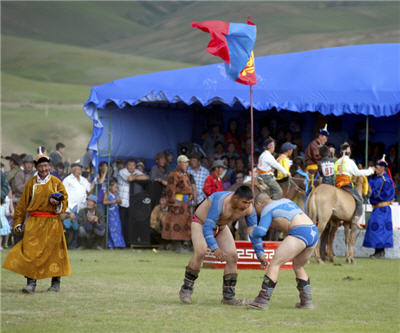Political infighting may be behind latest Oyu Tolgoi delay

No date has been set for world number two miner Rio Tinto (LON:ASX) and the government of Mongolia to sit down and thrash out a new deal for the controversial Oyu Tolgoi copper-gold mine.
Earlier indications from state owned news agency Montsame were that a meeting was scheduled for yesterday but Bloomberg reports that has now been contradicted by the Asian nation’s mines minister Davaajav Gankhuyag.
Mongolia owns 34% of Oyu Tolgoi located in the South Gobi desert. The government of the Asian nation has been at loggerheads with operator Turquoise Hill Resources (TSX:TRQ), which is controlled by Rio and the owner the remainder of the mine, for months.
According to a statement last week from Mongolia’s minister for economic development, Nyamjav Batbayar, on the state-run news agency web site there are six main sticking points, centered on cost overruns, the funding and feasibility study for phase 2 of the mine, the employment of Mongolian workers and contractors and corporate governance.
The drawn out negotiations have forced Turquoise Hill – which has already plonked $6 billion on the massive project – to fund construction from its own coffers under a temporary month-to-month budget ahead of scheduled commercial production in June.
The wrangling over Oyu Tolgoi which is set to dominate the economy of Mongolia, may be about more than just finances.
Julian Dierkes of the University of British Colombia writing in the Financial Times points out that political infighting among Mongolia’s politicians jockeying for position in the run up to presidential elections is complicating matters:
Previously, Mongolia’s president, prime minister and cabinet quickly dismissed calls for an opening of new negotiations without much comment. But last month President Tsakhia Elbegdorj aired some common misgivings about the project.
Among them were questions about the role of the three directors representing the state’s interest. Ts Elbegdorj singled out former President N Bagabandi’s role, sparking brief speculation about the possibility of Bagabandi standing against Elbegdorj in the coming presidential elections. The two sides have since engaged in several rounds of he-said-she-said ahead of a March 20 shareholder meeting.
The finger-pointing is difficult to disentangle from the outside. The government is learning on the job about the role of a co-investor in a large project that relies on international financing. Wrangling over Oyu Tolgoi’s construction budget and management fees highlight the contrast between administration-by-fiat in governmental affairs and the operation of its 51 per cent majority stake in the Erdenet mine, and an operation like Oyu Tolgoi, a private company reliant on global capital flows.
Mongolia has long coveted a bigger slice of the mine and has twice in the past couple of years floated proposals to take majority control.
Political rhetoric over a bill before the Mongolian parliament – elected last year on promises of greater resource nationalism – which contains sweeping changes for the mining industry has only added to the headaches of Rio and other foreign investors in the country.
Rio also suffered a setback earlier in March after the US raised serious concerns over Oyu Tolgoi’s environmental and social impact and decided to abstain from voting on a $4.5 billion debt package being negotiated with the World Bank and other institutions.
RELATED:
US raises serious concerns over Oyu Tolgoi’s environmental, social impact
Mongolia working hard to avoid the mistakes of 2009 with new mining law
More News
Contract worker dies at Rio Tinto mine in Guinea
Last August, a contract worker died in an incident at the same mine.
February 15, 2026 | 09:20 am
{{ commodity.name }}
{{ post.title }}
{{ post.date }}




Comments